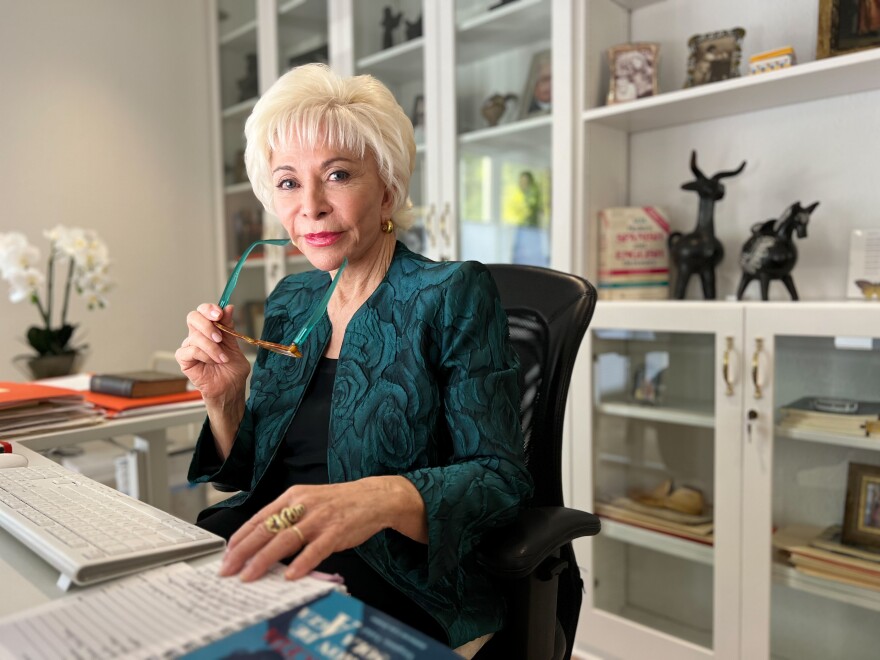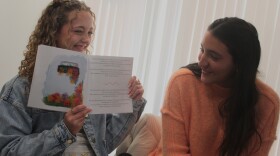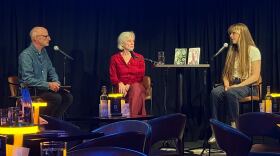One of the most popular books this summer at the Nashua Public Library, in both English and Spanish, is Isabel Allende’s “My name is Emilia del Valle.” The library says copies in both languages have been checked out for weeks.
Read a Spanish version of this story
The historical fiction novel tells the story of Emilia, who grows up in San Francisco with many questions about her past and a deep curiosity about Chile. This, along with her passion for writing, motivates her to visit that South American country in the midst of a civil war, in 1891. Emilia covers the war but also reconnects with her roots and herself.
Allende spoke with our ¿Qué Hay de Nuevo, New Hampshire? about the war that inspired the novel. She believes in the power of reliving the past to face current challenges.
Below is a translated transcript of the interview María Aguirre did with Allende in Spanish for NHPR.
Transcript
A lot of your other works, like “The Wind Knows My Name,” explore the connections between past and present. In a moment of fear and uncertainty for a lot of communities, what can the history in Emilia del Valle teach us about resilience?
I'm not trying to teach anything because I write fiction. When I have a message, I write nonfiction essays, I give speeches and I work through my foundation. All my activism, political and social, is through my foundation. But in any work of art, you can find echoes of your own life and what's happening to your life. In a historical novel, you can discover something in the past that has echoes or similarities with something that we are living today, and it gives us a new perspective to look at it from many angles, not just immersed in what is affecting us today. We are bombarded by bad news and we are trapped in a situation we can't see beyond it. So one of the great virtues of literature and art in general is that it gives us a broader vision of what's going on.
Who inspired the story of Emilia del Valle?
It was the Civil War. There was a Civil War in Chile in 1891 that has echoes and similarities with what happened in Chile 82 years later, in 1973. I was already alive then, in 1973. That's why it interested me so much what happened in the past, because in both times there was a progressive president that tried to make changes and involve the people and found a huge opposition from the conservative part of the country.
(Allende highlighted the difference between the military intervention in 1891 and 1973. In the first civil war, the army joined the government and the navy, the opposition. Although it lasted a bit, Allende said that the four months of battle caused more fatalities than in the war against Bolivia and Peru. In 1973, the armed forces intervened, but did not divide, and the result was a dictatorship that lasted 17 years.)
Both times, the president chose suicide before giving up or exile. This makes them heroic figures in the history of Chile. I was interested in the second episode, the military coup, and dictatorship because I saw that kind of thing happen, and I had the feeling it could happen again anytime.
Is there any woman -- or women -- in your life that inspired the character?
The character developed by bits. I wanted to tell the story of the way without taking a side. I had to have a neutral voice. The U.S. intervened in the war in 1891 and 1973, and I thought that the narrator had to come from outside, preferably from an American point of view. And because I live in California, I thought ‘Ok, then the character should be from California,’ and I always chose a female voice.
The reason behind it was because history is normally written by men, the victors, usually the white man; and voices of women are normally the defeated, as poor people, kids, and even animals. Lastly, they are never in any historic book, nowhere. And those were the voices I wanted to raise.
Although the story takes place between 1880 and 1890, I believe that from the beginning of the novel Emilia is a modern woman, someone who puts professional ideals before her personal or romantic ideals. Do you agree with me? Do you think Emilia is a modern woman?
There were many women in history that we could say were modern. Modern women are not exclusive to our age. There are always women that go forward and risk their life, and face abuse and exclusion. I belong to a generation of women that were raised to be mothers and wives. And we had to be the bridge, the transition between the world our mothers had and the world we want for our daughters and granddaughters.
So I had to be there to start the revolution. And it was fascinating, and it still is. I started early, and at 82 I have the same passion. I believe Emilia is like one of those female characters. She says in the book, "I'm a bad woman,” because a bad woman is any woman who doesn't conform to what was expected of her. Women had very limitations, had second-class roles, so to speak, and with very few options. She says, “No, I prefer to be a bad woman and do whatever I want.”
How could this book help a reader face the political moment we are living in the U.S. and Latin America?
I don't write to give a message. I want to tell a story that interests me, that moves me, and that's my job, tell the story in the funniest way possible. I don't try to give a message, but I believe that an attentive reader always could find parallels with their everyday life.
By reliving the past, I could understand the present. I don't let the circumstances overwhelm me. I understand that I can look at this with some perspective because I can compare it with what happened, and that also allows me to visualize the future.
That's why I don't want to lose the memory of what happened, and I don't want this moment to overrun us. Our life is changing in tremendous ways, and it's a very dangerous moment for the country, but we have lived other times like this. We don't have to forget this because it can draw us conclusions. But I'm saying this in an interview, this is not in the book. You can't put a message in a novel. You can't tell the reader what to think or believe. Don't underestimate the reader. Every reader finds in those lines what suits or helps them.








